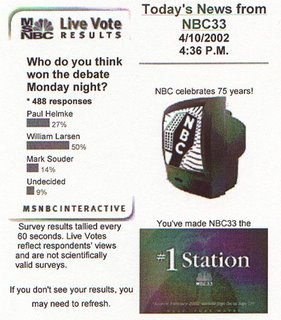Pay me now or pay me more later.
Have you ever heard the phrase "Pay me now or pay me more later." It simply means that if you put of paying the price for something now, it will cost more in the future. For every dollar the government, our representatives we elected, borrow, it will cost us money just like a credit card, student loan, mortgage or car loan. Money is not free.
So far the government on your behalf has borrowed over $35,000 that you will be paying interest on until the last penny is paid back. In 1957 the interest on the national debt amounted to less than 4% of the federal budget. It was common to have large surpluses. The debt accumulated during WWII was nearly paid in full by 1957. However, beginning in 1958 things changed. Our elected representatives borrowed money to pay for services that current tax revenues could not cover. It was not really anything new, because it had occurred before. The government we elected would run several years of deficits followed by several years of surpluses, thus keeping the national debt at a manageable level with its cost at less than 5% of revenues.
In 1959 they again borrowed money to pay for services and benefits that general tax revenues could not cover. This went on for decades and finally they lost track of what a balanced budget was. They began to include social security and Medicare surpluses to hide the fact the national debt was increasing. They came up with a unified budget to mask their negligence. They even for a short time attempted to mask the decreasing saving rate by including both Social Security and Medicare payroll taxes into the savings calculation because they were deferred benefits. The problem is these deferred benefits have a steep price tag. Without ever paying the price in the year they came due, they borrowed more money.
In the end we have had 52 years of consecutive deficits resulting in interest payments taking a full 50% of all federal income taxes each year. The amazing thing is, had the national debt been controlled, the $600 Billion spent on interest now each year would have covered the deficit of past years. In simple terms our economic problems are the direct result of not paying our bills when they came due. The little sacrifice back in 1957 in terms of increased taxes or reduced services would have eliminated our plight today.
So now this generation bears the full burden of past generations negligent fiduciary responsibility. So instead of paying the price today, we are again borrowing money to ease our burden which will require future generations to pay ever more for our greed and selfishness.
Why do I say greed and selfishness? Those who are now 40 are paying for the greed and selfishness of those of 1968 and before. The trillions borrowed today will benefit those today, but not those in the future who must pay the ultimate price for those borrowed funds.
Each generation has a fiduciary responsibility to leave this country in the same if not better condition than when they inherited it. What are you doing to preserve the United States? Do you vote intelligently for elected representatives?



0 Comments:
Post a Comment
<< Home